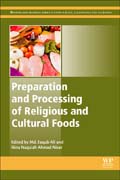
Preparation and Processing of Religious and Cultural Foods
Ali, Md. Eaqub
Naquiah Ahmad Nizar, Nina
Production, Preparation and Processing of Religious Foods covers the production and processing of foods from major religions, focusing on the intersection of religion, science, and cultural perceptions in the production and processing of modern religious and vegetarian foods. Quality control and authentication technologies are looked at in depth while nutrition, antioxidants, aging, hygiene, and other long-term health factors are presented from a scientific standpoint. Religious groups have often been slow in implementing recent science and technology breakthroughs employed in the preparation, processing, and packaging of various foods. This book provides a culturally sensitive coverage of these areas with an aim to encourage advancement. Topics such as nutrient fortification, probiotics, and nanotechnologies which have implications for religious and cultural foods are covered in detail. Bringing together the top scientific researchers in this essential topic of importance to a huge percentage of the world's population, this book will be essential reading for food company innovation and R&D managers, producers, and processers of religious foods. Covers the production and processing of major religious foods, namely Muslim, Christian, Jewish, Hindu, and BuddhistPresents nutritional, antioxidant, aging, hygiene, and other long-term health factors from a scientific standpointEncourages advancement in the preparation, processing, and packaging of religious foods using information cultivated from top scientific researchers in the field INDICE: Section 1: Introduction 1. Food Production: From Farm to Fork 2. Religious and Cultural Influences on the Selection of Menu 3. Religious and Cultural Foods: At the Crossroads of Science and Ethics 4. Business Trends and Opportunities: The Emerging Markets of Religious Foods 5. Nutritional and Health Impacts of Religious and Vegetarian Foods Section 2: Newly Emerging Issues in Religious and Cultural Foods 6. Innovative and Fortified Foods: Probiotics, Prebiotics, GMOs and Superfoods 7. Applications and Impacts of Nanomaterials in Food Safety and Quality 8. Nanomaterials for Food Packaging 9. Nano-Delivery Systems in Food and Drugs 10. Effect of Food Processing, Quality and Food Safety with Emphasis on GM Food, Kosher and Halal, Vegetarian and Hindus' Food 11. Gelatine and Collagen, Enzymes and Single Cell Proteins 12. Fats, Oils and Emulsifiers 13. Hormones 14. Alcohol in Religious and Cultural Foods Section 3: Standard Practices and Legislation 15. Conventional and Modern Standards of Food Production 16. Cross Contamination in Processing, Packaging, Storage and Transports Section 4: Animal Killing and Meat Processing 17. The Standard Procedures for Animal Slaughtering in the Industry 18. Evaluating Methods of Restraint for Holding Animals during Religious Slaughter 19. Meat Quality and Animal Welfare: Religious and Scientific Perspectives Section 5: Controlling the Sanctity of Religious Foods 20. Protein-Based Techniques 21. Lipid-Based Techniques Used for Halal and Kosher Food Authentication 22. DNA-Based Authentication Techniques 23. Authentication of Slaughtering Methods 24. Conclusion and Future Remarks
- ISBN: 978-0-08-101892-7
- Editorial: Woodhead Publishing
- Encuadernacion: Rústica
- Páginas: 400
- Fecha Publicación: 01/08/2018
- Nº Volúmenes: 1
- Idioma: Inglés
